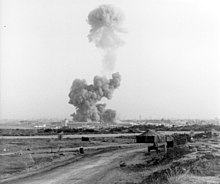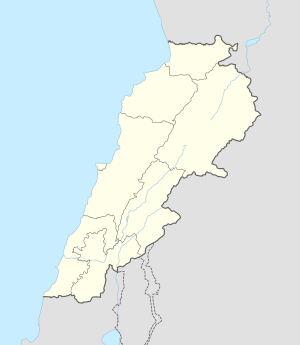Our website is made possible by displaying online advertisements to our visitors.
Please consider supporting us by disabling your ad blocker.
1983 Beirut barracks bombings
| 1983 Beirut barracks bombings | |
|---|---|
| Part of the Iran–Iraq War and the Lebanese Civil War | |
 A smoke cloud rises from the rubble of the bombed barracks at Beirut International Airport (BIA). | |
| Location |
|
| Date | October 23, 1983 06:22 am |
Attack type | Suicide attack, truck bombs |
| Deaths | Total: 307
|
| Injured | 150 |
| Perpetrator |
|
| Motive | United States and French support for Iraq |
On October 23, 1983, two truck bombs were detonated at buildings in Beirut, Lebanon, housing American and French service members of the Multinational Force in Lebanon (MNF), a military peacekeeping operation during the Lebanese Civil War. The attack killed 307 people: 241 U.S. and 58 French military personnel, six civilians, and two attackers.
Early that Sunday morning, the first suicide bomber detonated a truck bomb at the building serving as a barracks for the 1st Battalion 8th Marines (Battalion Landing Team – BLT 1/8) of the 2nd Marine Division, killing 220 marines, 18 sailors and three soldiers, making this incident the deadliest single-day death toll for the United States Marine Corps since the Battle of Iwo Jima in World War II and the deadliest single-day death toll for the United States Armed Forces since the first day of the Tet Offensive in the Vietnam War.[1][2] Another 128 Americans were wounded in the blast. 13 later died of their injuries, and they are counted among the number who died.[3] An elderly Lebanese man, a custodian/vendor who was known to work and sleep in his concession stand next to the building, was also killed in the first blast.[4][1][5] The explosives used were later estimated to be equivalent to as much as 12,000 pounds (5,400 kg) of TNT.[6][7][8]
Minutes later, a second suicide bomber struck the nine-story Drakkar building, a few kilometers away, where the French contingent was stationed. 55 paratroopers from the 1st Parachute Chasseur Regiment and three paratroopers of the 9th Parachute Chasseur Regiment were killed and 15 injured. It was the single worst French military loss since the end of the Algerian War.[9] The wife and four children of a Lebanese janitor at the French building were also killed, and more than twenty other Lebanese civilians were injured.[10]
A group called Islamic Jihad claimed responsibility for the bombings and said that the aim was to force the MNF out of Lebanon.[11] According to Caspar Weinberger, then United States Secretary of Defense, there is no knowledge of who did the bombing.[12] Some analysis highlights the role of Hezbollah and Iran, calling it "an Iranian operation from top to bottom".[13] There is no consensus on whether Hezbollah existed at the time of bombing.[14] The attacks eventually led to the withdrawal of the international peacekeeping force from Lebanon, where they had been stationed following the Palestine Liberation Organization (PLO) withdrawal in the aftermath of Israel's 1982 invasion of Lebanon.
- ^ a b Geraghty (2009), p. xv
- ^ Phillips, James (October 23, 2009). "The 1983 Marine Barracks Bombing: Connecting the Dots". The Heritage Foundation. Archived from the original on March 6, 2024. Retrieved October 2, 2023.
- ^ Hammel (1985), p. 386.
- ^ Hammel (1985), p. 394.
- ^ "Part 8 – Casualty Handling". Report of the DoD Commission on Beirut International Airport Terrorist Act, October 23, 1983. Archived from the original on October 11, 2007. Retrieved September 30, 2007.
- ^ Cite error: The named reference
perleslaw.comwas invoked but never defined (see the help page). - ^ Geraghty (2009), pp. 185–186
- ^ "Report of the DoD Commission on Beirut International Airport Terrorist Attack, October 23, 1983" (PDF). December 20, 1983. Archived (PDF) from the original on September 21, 2023. Retrieved September 29, 2023.
- ^ Wright, Robin, Sacred Rage, Simon and Schuster, 2001, p. 72
- ^ "On This Day: October 23". The New York Times. October 23, 1983. ISSN 0362-4331. Archived from the original on December 26, 2022. Retrieved June 13, 2014.
- ^ Stephens, Bret (October 22, 2012). "Stephens: Iran's Unrequited War". The Wall Street Journal. Archived from the original on November 24, 2012. Retrieved November 21, 2012.
- ^ "target america". Frontline. WGBH. October 4, 2001. Archived from the original on February 24, 2021. Retrieved August 23, 2017.
- ^ "now.mmedia.me 30 October 2014". Archived from the original on August 3, 2015. Retrieved November 1, 2014.
- ^ "The Fog over the 1983 Beirut Attacks". FRONTLINE - Tehran Bureau. Archived from the original on February 11, 2021. Retrieved October 26, 2017.
Previous Page Next Page
تفجيرا بيروت 1983 Arabic 1983 Beyrut kazarma bombalanması AZ Sebevražedné bombové útoky na kasárny mírových sil v Bejrútu Czech Angrebet på MNF i Beirut 1983 Danish Anschlag auf die Multinationalen Streitkräfte im Libanon am 23. Oktober 1983 German Βομβιστικές επιθέσεις σε στρατόπεδα της Βηρυτού (1983) Greek Atentado contra los cuarteles en Beirut en 1983 Spanish انفجار مقر تفنگداران دریایی آمریکا در بیروت FA Beirutin autopommi-isku 1983 Finnish Attentats de Beyrouth du 23 octobre 1983 French



